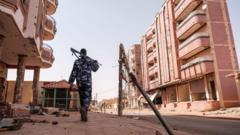This article discusses the international reactions to the recent overthrow of President Bashar al-Assad by rebel forces, indicating a potential shift toward peace and reconciliation for Syria after years of conflict.
Syria's New Era: Global Responses to the Fall of Assad

Syria's New Era: Global Responses to the Fall of Assad
World leaders express cautious hope for Syria following rebel takeover.
In a historic moment for Syria, global leaders reacted with cautious optimism to the news of President Bashar al-Assad's overthrow by rebel forces. As the political landscape shifts after more than a decade of civil war, the repercussions and potential for peace are at the forefront of international discussions. On December 8, 2024, supporters of the Syrian opposition celebrated in Istanbul's Faith Mosque, waving flags symbolizing their victory.
The United Nations' special envoy for Syria, Geir Pedersen, described the event as a “watershed moment” in a statement that acknowledged the painful history and suffering endured by the Syrian people. He expressed hope for a future defined by peace, reconciliation, and dignity, urging all Syrians to engage in dialogue and respect international humanitarian norms in the rebuilding process.
Across the Atlantic, U.S. officials reacted similarly but with an emphasis on vigilance. Daniel Shapiro, the U.S. deputy assistant secretary of defense for the Middle East, remarked that the end of the Assad regime should not elicit sadness, affirming that the U.S. would retain its military presence in eastern Syria to thwart the resurgence of ISIS and safeguard American forces in the region.
As reactions from various nations unfold, fundamental questions regarding Syria's future governance remain unresolved. With multiple factions wielding power across the country, the primary rebel coalition faces significant challenges in unifying various interests and addressing the needs of the population. The international community watches closely as Syria embarks on this uncertain and pivotal journey toward rebuilding and reconciliation.
The United Nations' special envoy for Syria, Geir Pedersen, described the event as a “watershed moment” in a statement that acknowledged the painful history and suffering endured by the Syrian people. He expressed hope for a future defined by peace, reconciliation, and dignity, urging all Syrians to engage in dialogue and respect international humanitarian norms in the rebuilding process.
Across the Atlantic, U.S. officials reacted similarly but with an emphasis on vigilance. Daniel Shapiro, the U.S. deputy assistant secretary of defense for the Middle East, remarked that the end of the Assad regime should not elicit sadness, affirming that the U.S. would retain its military presence in eastern Syria to thwart the resurgence of ISIS and safeguard American forces in the region.
As reactions from various nations unfold, fundamental questions regarding Syria's future governance remain unresolved. With multiple factions wielding power across the country, the primary rebel coalition faces significant challenges in unifying various interests and addressing the needs of the population. The international community watches closely as Syria embarks on this uncertain and pivotal journey toward rebuilding and reconciliation.





















